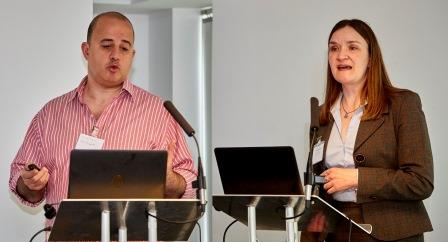Date published: 12/02/18

Developing personalised monitoring for Parkinson’s Disease
- Name: Dr Walied Mowafi
- Current Organisation: Calderdale and Huddersfield NHS Trust
- Current Position: Consultant Neurologist
- Secondment organisation: Leeds Beckett University
My area of interest
I am a Consultant Neurologist with Calderdale and Huddersfield NHS Trust and I am interested in using sensors to monitor patients with Parkinson’s Disease at home.
I regularly treat a number of patients with Parkinson’s Disease and I have become very aware of the challenges they encounter in daily living. In general, I see patients at my clinic every 6 months and I have limited time to spend with them.
Patients often describe experiencing a deterioration in their ability to cope with daily living tasks between appointments at my clinic, I am interested in using sensor technology to monitor these patients at home. This would provide me with more regular assessments of their condition and enable tailoring of clinic appointments for when they are needed. Development of personalised monitoring would also provide reassurance for patients.
Research collaboration
After discussions with my research collaborator, Dr Sareen Galbraith, at Leeds Beckett University, she then approached collaborators in an Indian Technology company – Axxonet Global Pvt. – to supply a prototype glove sensor. I applied for my Translate clinical secondment at Leeds Beckett University to develop this prototype glove sensor for monitoring upper limb movement.
The secondment is vital to progress development of the glove sensors. It provides me with the opportunity to meet with Dr Galbraith to design upper limb movement tasks that relate to the assessments I ask patients to perform in my clinic. The upper limb movement tasks will then be performed by volunteer participants wearing the glove sensor. This will allow us to fully test the prototype glove sensor and analyse the data.
Why Leeds Beckett University
I chose Leeds Beckett University for my secondment because they have signed a Memorandum of Understanding with Axxonet Global Pvt to develop medical technologies, such as glove sensors.
Dr Galbraith and the neurology research team have the expertise to collaborate to develop the glove sensors for personalised monitoring of Parkinson’s Disease. This secondment will allow me to work with Dr Galbraith to design the upper limb movement tasks and assist with testing of the prototype glove sensor prototype, thus providing the results needed to apply for IRAS (NHS ethics) in order to test the glove sensor on patients.
I will be able to progress my clinical research by establishing my collaboration, receiving training in the use of sensors and providing preliminary data for ethical approval.
Developing glove sensors to monitor upper limb movement in Parkinson’s Disease
Designing movement tasks for Parkinson’s Disease
I am using my secondment to develop glove sensors to monitor upper limb movement in Parkinson’s Disease. My normal working week involves patient consultations during my clinics. I regularly treat patients with Parkinson’s Disease who often describe a deterioration in their ability to cope with daily living tasks between appointments which I am unable to monitor.
My secondment at Leeds Beckett involved meetings with Dr Galbraith and her team to draw up a list of upper limb movement tasks that relate to the assessments I ask patients to perform in my clinic. Instead of my normal patient clinics I have been able to regularly discuss my research ideas in person with a team of researchers. I have benefited from use of the library and other research facilities.
I am working with Dr Galbraith and her team to test the prototype glove sensor. The upper limb movement tasks that we identified were tested by two Nuffield placement students who wore the prototype glove sensor and performed the movements. This allowed us to test the prototype glove sensor and analyse the data. We have focused our initial tests on measurement of arm velocity and time to peak velocity during the upper limb movement task of drinking a glass of water.
Benefits of my secondment so far
This secondment has provided me with training in the use of sensors and given the research team preliminary data for IRAS (NHS ethical) approval to test the glove sensors on Parkinson’s Disease patients. Development of glove sensors for patients to use at home will provide me with more regular assessments of their condition and enable tailoring of clinic appointments. Development of personalised monitoring would also provide reassurance for patients.
Personalised monitoring for Parkinson’s Disease patients
My secondment in collaboration with Dr Sareen Galbraith at Leeds Beckett University developed “Clasp” glove sensors for monitoring upper limb movement in patients with Parkinson’s Disease. We designed upper limb movement tasks that were related to patient assessments performed in my clinics. A prototype glove sensor made by Axxonet System Technologies Pvt Ltd, India was used to measure these tasks. We focussed our sensor measurements on arm velocity and time to reach peak velocity in volunteers who moved a glass and picked up a pen or tennis ball.
This secondment provided me with training in using sensors for the measurement of upper limb movement in neurological diseases. I really benefitted from the experience of working as part of a research team. We successfully applied for a further secondment to carry out development of the prototype glove sensors with Axxonet.
The highlight of my secondment was being involved in clinical research that will directly benefit my patients by providing personalised monitoring. By developing sensors that can be used in the patient’s home, we can provide regular assessments of the disease progression for clinical staff.
This secondment has really helped me to realise my goal of becoming involved in clinical research. I am excited about working to further develop the glove sensors for personalised monitoring of Parkinson’s disease. I would highly recommend Translate secondments to anyone who is interested in becoming involved in a clinical research.







